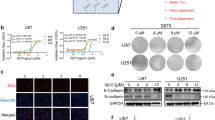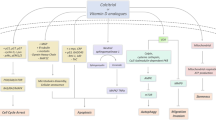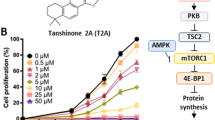Summary
Steroids are essential for the control of oedema in human malignant glioma patients but may interfere with the efficacy of chemotherapy. Boswellic acids are phytotherapeutic anti-inflammatory agents that may be alternative drugs to corticosteroids in the treatment of cerebral oedema. Here, we report that boswellic acids are cytotoxic to malignant glioma cells at low micromolar concentrations. In-situ DNA end labelling and electron microscopy reveal that boswellic acids induce apoptosis. Boswellic acid-induced apoptosis requires protein, but not RNA synthesis, and is neither associated with free radical formation nor blocked by free radical scavengers. The levels of BAX and BCL-2 proteins remain unaltered during boswellic acid-induced apoptosis. p21 expression is induced by boswellic acids via a p53-independent pathway. Ectopic expression of wild-type p53 also induces p21, and facilitates boswellic acid-induced apoptosis. However, targeted disruption of the p21 genes in colon carcinoma cells enhances rather than decreases boswellic acid toxicity. Ectopic expression of neither BCL-2 nor the caspase inhibitor, CRM-A, is protective. In contrast to steroids, subtoxic concentrations of boswellic acids do not interfere with cancer drug toxicity of glioma cells in acute cytotoxicity or clonogenic cell death assays. Also, in contrast to steroids, boswellic acids synergize with the cytotoxic cytokine, CD95 ligand, in inducing glioma cell apoptosis. This effect is probably mediated by inhibition of RNA synthesis and is not associated with changes of CD95 expression at the cell surface. Further studies in laboratory animals and in human patients are required to determine whether boswellic acids may be a useful adjunct to the medical management of human malignant glioma.
Similar content being viewed by others
Article PDF
Change history
16 November 2011
This paper was modified 12 months after initial publication to switch to Creative Commons licence terms, as noted at publication
References
Ammon, H. P. T. (1996). Salai Guggal-Boswellia serrata: From a herbal medicine to a non redox inhibitor of leukotriene biosynthesis. Eur J Med Res 1: 369–370.
Böker, D. K. & Winking, M. (1997). Die Rolle von Boswellia-Säuren in der Therapie maligner Gliome. Deutsches Ärzteblatt 94: B958–B960.
Gomez-Manzano, C., Fueyo, J., Kyritsis, A. P., McDonnell, T. J., Steck, P. A., Levin, V. A. & Yung, W. K. A. (1997). Characterization of p53 and p21 functional interactions in glioma cells en route to apoptosis. J Natl Cancer Inst 89: 1036–1044.
Gupta, I., Parihar, A., Malhotra, P., Singh, G. B., Lüdtke, R., Safayhi, H. & Ammon, H. P. T. (1997). Effects of boswellia serrata gum resin in patients with ulcerative colitis. Eur J Med Res 2: 37–43.
Heldt, R. M., Syrovets, T., Winking, M., Sailer, E. R., Safayhi, H., Ammon, H. P. T. & Simmet, T. H. (1997). Boswellic acids exhibit cytotoxic effects on brain tumor cells independent from 5-lipoxygenase inhibition. Naunyn-S-Arch Pharmacol 355: 30 (Abstract)
Hoernlein, R. F., Orlikowsky, T. H., Niethammer, D., Sailer, E-R, Dannecker, G. E. & Ammon, H. P. T. (1997). Acetyl-11-keto-β-boswellic acid (AKBA) induces apoptosis in HL60 and CCRF-CEM cells and inhibits topoisomerase I. Soc Cancer Res 1291: (Abstract)
Jung, J. M., Bruner, J. M., Ruan, S., Langford, L. A., Kyritsis, A. P., Kobayashi, T., Levin, V. A. & Zhang, W. (1995). Increased levels of p21WAF1/Cip1 in human brain tumors. Oncogene 11: 2021–2028.
Michalowitz, D., Halevy, O. & Oren, M. (1990). Conditional inhibition of transformation and of cell proliferation by a temperature-sensitive mutant of p53. Cell 62: 674–680.
Michieli, P., Chedid, M., Lin, D., Pierce, J. H., Mercer, W. E. & Givol, D. (1994). Induction of WAF1/CIP1 by a p53-independent pathway. Cancer Res 54: 3391–3395.
Naumann, U., Durka, S. & Weller, M. (1998). Dexamethasone-mediated protection from drug toxicity linked to p21WAF/CIP1 protein accumulation. Oncogene 17: 1567–1575.
Roth, W., Fontana, A., Trepel, M., Dichgans, J., Reed, J. C. & Weller, M. (1997). Immunochemotherapy of malignant glioma: synergistic activity of CD95 ligand and chemotherapeutics. Cancer Immunol Immunother 44: 55–63.
Reber, U., Wüllner, U., Trepel, M., Baumgart, J., Seyfried, J., Klockgether, T., Dichgans, J. & Weller, M. (1998). Potentiation of treosulfan toxicity by the glutathione-depleting agent, buthionine sulfoximine, in human malignant glioma cells: the role of bcl-2. Biochem Pharmacol 55: 349–359.
Rowe, T. C., Chen, G. L., Hsiang, Y. H. & Liu, L. F. (1986). DNA damage by antitumor acridines mediated by mammalian DNA topoisomerase II. Cancer Res 46: 2021–2026.
Ruan, S., Okcu, M. F., Ren, J. P., Chiao, P., Andreeff, Levin, V. & Zhang, W. (1998). Overexpressed WAF1/Cip1 renders glioblastoma cells resistant to chemotherapy agents 1,3-bis(2-chloroethyl)-1-nitrosourea and cisplatin. Cancer Res 58: 1538–1543.
Safayhi, H., Mack, T., Sabieraj, J. & Ammon, H. P. T. (1992). Boswellic acids: novel, specific non-redox inhibitors of 5-lipoxygenase. J Pharmacol Exp Ther 261: 1143–1146.
Safayhi, H., Sailer, E. R. & Ammon, H. P. T. (1995). Mechanism of 5-lipoxygenase inhibition by acetyl-11-keto-β-boswellic acids. Mol Pharmacol 47: 1212–1216.
Safayhi, H., Rall, B., Sailer, E. R. & Ammon, H. P. T. (1997). Inhibition by boswellic acids of human leukocyte elastase. J Pharmocol Exp Ther 281: 460–463.
Sailer, E. R., Subramanian, L. R., Rall, B., Hoernlein, R. F., Ammon, H. P. T. & Safayhi, H. (1996). Acetyl-11-keto-β-boswellic acid (AKBA): structure requirements for binding and 5-lipoxygenase inhibitory activity. Br J Pharmacol 117: 615–618.
Schulz, J. B., Weller, M. & Klockgether, T. (1996). A sequential requirement for new mRNA and protein synthesis, ICE-like protease activity, and free radicals in potassium deprivation-induced apoptosis of cerebellar granule cells. J Neurosci 16: 4696–4706.
Sheikh, M., Chen, Y. Q., Smith, M. L. & Fornace, A. J. (1997). Role of p21Waf1/Cip1/Sdi1 in cell death and DNA repair as studied using a tetracycline-inducible system in p53-deficient cells. Oncogene 14: 1875–1882.
Strasser, A., Harris, A. W., Huang, D. C., Krammer, P. H. & Cory, S. (1995). Bcl-2 and Fas/Apo-1 regulate distinct pathways to lymphocyte apoptosis. EMBO J 14: 6136–6147.
Trepel, M., Groscurth, P., Malipiero, U., Gulbins, E., Dichgans, J. & Weller, M. (1998). Chemosensitivity of human malignant glioma: modulation by p53 gene transfer. J Neuro-Oncol 39: 19–32.
Van Meir, E. G., Kikuchi, T., Tada, M., Li, H., Diserens, A. C., Wojcik, B. E., Huang, H. J. S., Friedmann, T., De Tribolet, N. & Cavenee, W. K. (1994). Analysis of the p53 gene and its expression in human glioblastoma cells. Cancer Res 54: 649–652.
Wagenknecht, B., Gulbins, E., Lang, F., Dichgans, J. & Weller, M. (1997a). Lipoxygenase inhibitors block CD95 ligand-mediated apoptosis of human malignant glioma cells. FEBS Lett 409: 17–23.
Wagenknecht, B., Trepel, M., von Deimling, A., Grimmel, C., Rollbrocker, B., Hayashi, Y., Lang, F., Dichgans, J., Gulbins, E. & Weller, M. (1997b). p53 accumulation promotes dephosphorylation and proteolytic cleavage of retinoblastoma protein in human malignant glioma cells. Cell Physiol Biochem 7: 304–311.
Wagenknecht, B., Schulz, J. B., Gulbins, E. & Weller, M. (1998). CD95L-induced apoptosis of malignant glioma cells: inhibition of the cascade by crm-A, bcl-2, and NDGA. Cell Death Differ 5: 894–900.
Waldman, T., Kinzler, K. W. & Vogelstein, B. (1995). p21 is necessary for the p53-mediated G1 arrest in human cancer cells. Cancer Res 55: 5187–5190.
Waldman, T., Lengauer, C., Kinzler, K. W. & Vogelstein, B. (1996). Uncoupling of S phase and mitosis induced by anticancer agents in cells lacking p21. Nature 381: 713–716.
Weller, M., Frei, K., Groscurth, P., Krammer, P. H., Yonekawa, Y. & Fontana, A. (1994). Anti-Fas/APO-1 antibody-mediated apoptosis of cultured human malignant glioma cells. Induction and modulation of sensitivity by cytokines. J Clin Invest 94: 954–964.
Weller, M., Malipiero, U. V., Aguzzi, A., Reed, J. C. & Fontana, A. (1995a). Protooncogene bcl-2 gene transfer abrogates Fas/APO-1 antibody-mediated apoptosis of human malignant glioma cells and confers resistance to chemotherapeutic drugs and therapeutic irradiation. J Clin Invest 95: 2633–2643.
Weller, M., Malipiero, U., Rensing-Ehl, A., Barr, P. & Fontana, A. (1995b). Fas/APO-1 gene transfer for human malignant glioma. Cancer Res 55: 2936–2944.
Weller, M., Schmidt, C., Roth, W. & Dichgans, J. (1997a). Chemotherapy of human malignant glioma: prevention of efficacy by dexamethasone?. Neurology 48: 1704–1709.
Weller, M., Trepel, M., Grimmel, C., Schabet, M., Bremen, D., Krajewski, S. & Reed, J. C. (1997b). Hypericin-induced apoptosis of human malignant glioma cells is light-dependent, independent of bcl-2 expression, and does not require wild-type p53. Neurol Res 19: 459–470.
Weller, M., Winter, S., Schmidt, C., Esser, P., Fontana, A., Dichgans, J. & Groscurth, P. (1997c). Topoisomerase I inhibitors for human malignant glioma. Differential modulation of p53, p21, bax and bcl-2 expression and of CD95-mediated apoptosis by camptothecin and β-lapachone. Int J Cancer 73: 707–714.
Weller, M., Rieger, J., Grimmel, C., Van Meir, E. G., De Tribolet, N., Krajewski, S., Reed, J. C., von Deimling, A. & Dichgans, J. (1998). Predicting chemoresistence in human malignant glioma cells: the role of molecular genetic analyses. Int J Cancer 79: 640–644.
Winking, M., Sarikya, S., Jödicke, A. & Böker, D. K. (1998). Boswellic acids inhibit glioma growth. J Cancer Res Clin Oncol 124: R141 (Abstr.)
Winter, S., Roth, W., Dichgans, J. & Weller, M. (1998). Synergy of CD95 ligand and teniposide: no role of cleavable complex formation and enhanced CD95 expression. Eur J Pharmacol 341: 323–328.
Winter, S. & Weller, M. (1998). Potentiation of CD95L-induced apoptosis of human malignant glioma cells by topotecan involves inhibition of RNA synthesis but not changes in CD95 or CD95L expression. J Pharmacol Exp Ther 286: 1374–1382.
Author information
Authors and Affiliations
Rights and permissions
From twelve months after its original publication, this work is licensed under the Creative Commons Attribution-NonCommercial-Share Alike 3.0 Unported License. To view a copy of this license, visit http://creativecommons.org/licenses/by-nc-sa/3.0/
About this article
Cite this article
Glaser, T., Winter, S., Groscurth, P. et al. Boswellic acids and malignant glioma: induction of apoptosis but no modulation of drug sensitivity. Br J Cancer 80, 756–765 (1999). https://doi.org/10.1038/sj.bjc.6690419
Received:
Revised:
Accepted:
Published:
Issue Date:
DOI: https://doi.org/10.1038/sj.bjc.6690419



